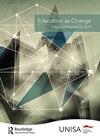南非印第安人视角下的非殖民化思考:维韦卡南达诗歌《我的戏演完了》中的概念隐喻
IF 1
4区 教育学
Q3 EDUCATION & EDUCATIONAL RESEARCH
引用次数: 0
摘要
斯瓦米·维韦卡南达是一位有影响力的印度圣人、诗人、哲学家和政治革命者。他的作品可以被视为散居印度的南非印度教徒的渠道,让他们能够在印度的宗教和概念世界中与自己的历史、文化和精神根源联系起来。使那些遭受殖民霸权统治的人非殖民化的第一步是(重新)将他们与他们的知识和精神根源联系起来,这里有人认为,这正是维韦卡南达的生活和使命背后的时代精神。他的诗歌特别有价值,因为他用英语而不是母语孟加拉语写作,因此能够接触到世界各地讲英语的印度教徒。1936年,南非的印度人决定采用英语作为通用语,既作为教学语言,也作为母语。这篇文章的重点是维韦卡南达1895年在纽约创作的其中一首诗《我的戏完成了》。这首诗从印度教的角度呈现了人类的状况,这与西方的思维方式有很大的不同。本文在概念隐喻理论的框架内对这些概念进行了探讨。通过诗歌中使用的隐喻,我们将探讨印度教哲学思想的各个方面,展示东方概念现实与西方思想的不同。这为世界各地的散居者提供了一种古老的殖民前思维方式的联系。本文章由计算机程序翻译,如有差异,请以英文原文为准。
Reflections on Decoloniality from a South African Indian Perspective: Conceptual Metaphors in Vivekananda’s Poem “My Play Is Done”
Swami Vivekananda was an influential Indian saint, poet, philosopher and political revolutionary. His work can be seen as a conduit for South African Hindus who are part of the Indian diaspora, allowing them to connect with their historical, cultural and spiritual roots in the religious and conceptual world of India. The first step to decolonising those who have been subjected to colonial hegemony is to (re)connect them with their intellectual and spiritual roots, and it is argued here that this is precisely the zeitgeist behind Vivekananda’s life and mission in general. His poetry is particularly valuable because he wrote in English, instead of his native Bengali, and was thereby able to reach English-speaking Hindus all over the world. In 1936 Indians in South Africa decided to adopt English as a lingua franca, both as a language of teaching and learning, and as a home language. This article focuses on one of these poems, “My Play Is Done”, which Vivekananda composed in 1895 in New York. The poem presents the human condition from a Hindu perspective, which differs substantially from the Western way of thinking. This article explores these concepts within the framework of conceptual metaphor theory. With reference to metaphors used in the poem, various aspects of Hindu philosophical thought will be explored, showing how Oriental conceptual reality differs from Western thought. This provides a link to an ancient precolonial way of thinking, accessible to diasporas around the world.
求助全文
通过发布文献求助,成功后即可免费获取论文全文。
去求助
来源期刊

Education As Change
EDUCATION & EDUCATIONAL RESEARCH-
CiteScore
1.40
自引率
0.00%
发文量
29
审稿时长
24 weeks
期刊介绍:
Education as Change is an accredited, peer reviewed scholarly online journal that publishes original articles reflecting critically on issues of equality in education and on the ways in which educational practices contribute to transformation in non-formal, formal and informal contexts. Critique, mainly understood in the tradition of critical pedagogies, is a constructive process which contributes towards a better world. Contributions from and about marginalised communities and from different knowledge traditions are encouraged. The articles could draw on any rigorous research methodology, as well as transdisciplinary approaches. Research of a very specialised or technical nature should be framed within relevant discourses. While specialised kinds of research are encouraged, authors are expected to write for a broader audience of educational researchers and practitioners without losing conceptual and theoretical depth and rigour. All sectors of education are covered in the journal. These include primary, secondary and tertiary education, adult education, worker education, educational policy and teacher education.
 求助内容:
求助内容: 应助结果提醒方式:
应助结果提醒方式:


